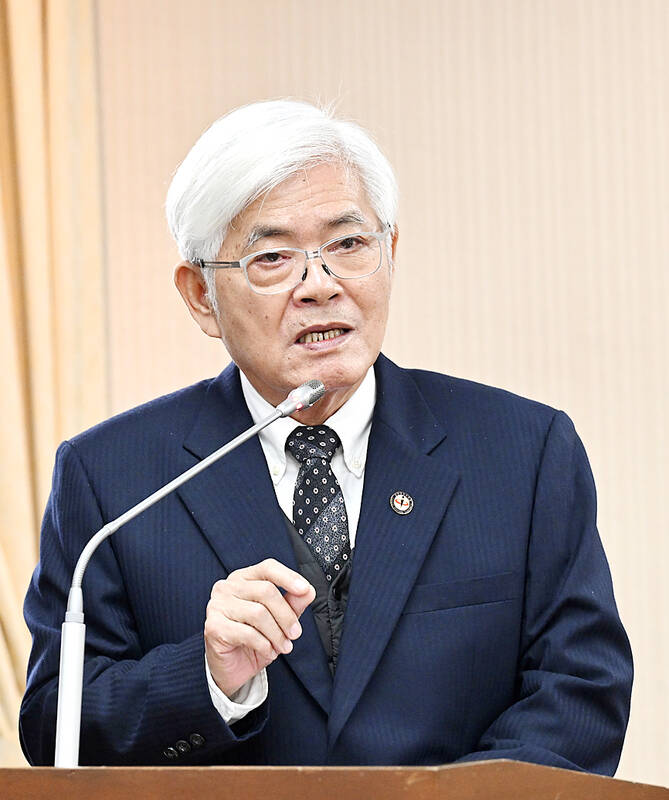Central Election Commission (CEC) Chairman Lee Chin-yung (李進勇) yesterday said that absentee voting should first be allowed in referendums on key issues, but election reform should proceed cautiously to prevent foreign nations from interfering in elections.
“One of the major challenges that democratic nations face is severe election interventions from external forces,” Lee told reporters before a meeting of the legislature’s Internal Administration Committee. “We should ensure that any change to the election system would be as perfect as possible and that it would continue upholding core democratic values.”
The Executive Yuan last month proposed permitting transfer voting, a type of absentee voting, in referendums, Lee said.

Photo: Lo Pei-de, Taipei Times
“We have had experience with transfer voting. By allowing transfer voting in referendums, we hope to collect feedback from all stakeholders before making the voting method available in elections,” he said.
Absentee voting should ensure that voters are able to exercise their right of free will, and the right to cast a secret ballot should be protected, he added.
“We have submitted our proposed amendment to the Referendum Act (公民投票法) to the legislature for review and hope it would be passed during this legislative session. This would be crucial in making a firm and steady step toward absentee voting,” Lee said.
Transfer voting allows voters to cast ballots in polling booths that are not ones assigned to them based on their registered address. Voters who request transfer voting must still personally cast their votes in polling booths.
The Chinese Nationalist Party (KMT) caucus is pushing to have the government administer postal voting, which would allow voters at home and overseas to mail in their ballots.
Meanwhile, National Security Bureau Director-General Tsai Ming-yen (蔡明彥) said on the sidelines of a meeting of the legislature’s Foreign Affairs and National Defense Committee yesterday that many nations take into account national security implications before allowing absentee voting.
“From the bureau’s perspective, we will remind lawmakers and government officials of the risks involved in postal voting. Voters who are in other nations, particularly those in China, might be directed to vote against their will,” Tsai said.
Democratic Progressive Party Legislator Huang Jie (黃捷) also questioned the feasibility of allowing Taiwanese working and studying in China to mail in ballots.
“Australians can safely cast their votes in China because they can vote in the Australian embassy there without worrying that somebody would force them to change their vote,” she said at a meeting of the legislature’s Internal Administration Committee. “How can we make sure Taiwanese can vote of their own free will, given that we have no embassy, consulate or office there? It is a joke just thinking about that.”

EXPRESSING GRATITUDE: Without its Taiwanese partners which are ‘working around the clock,’ Nvidia could not meet AI demand, CEO Jensen Huang said Taiwan Semiconductor Manufacturing Co (TSMC, 台積電) and US-based artificial intelligence (AI) chip designer Nvidia Corp have partnered with each other on silicon photonics development, Nvidia founder and CEO Jensen Huang (黃仁勳) said. Speaking with reporters after he met with TSMC chairman C.C. Wei (魏哲家) in Taipei on Friday, Huang said his company was working with the world’s largest contract chipmaker on silicon photonics, but admitted it was unlikely for the cooperation to yield results any time soon, and both sides would need several years to achieve concrete outcomes. To have a stake in the silicon photonics supply chain, TSMC and

IDENTITY: Compared with other platforms, TikTok’s algorithm pushes a ‘disproportionately high ratio’ of pro-China content, a study has found Young Taiwanese are increasingly consuming Chinese content on TikTok, which is changing their views on identity and making them less resistant toward China, researchers and politicians were cited as saying by foreign media. Asked to suggest the best survival strategy for a small country facing a powerful neighbor, students at National Chia-Yi Girls’ Senior High School said “Taiwan must do everything to avoid provoking China into attacking it,” the Financial Times wrote on Friday. Young Taiwanese between the ages of 20 and 24 in the past were the group who most strongly espoused a Taiwanese identity, but that is no longer

A magnitude 6.4 earthquake and several aftershocks battered southern Taiwan early this morning, causing houses and roads to collapse and leaving dozens injured and 50 people isolated in their village. A total of 26 people were reported injured and sent to hospitals due to the earthquake as of late this morning, according to the latest Ministry of Health and Welfare figures. In Sising Village (西興) of Chiayi County's Dapu Township (大埔), the location of the quake's epicenter, severe damage was seen and roads entering the village were blocked, isolating about 50 villagers. Another eight people who were originally trapped inside buildings in Tainan

‘ARMED GROUP’: Two defendants used Chinese funds to form the ‘Republic of China Taiwan Military Government,’ posing a threat to national security, prosecutors said A retired lieutenant general has been charged after using funds from China to recruit military personnel for an “armed” group that would assist invading Chinese forces, prosecutors said yesterday. The retired officer, Kao An-kuo (高安國), was among six people indicted for contravening the National Security Act (國家安全法), the High Prosecutors’ Office said in a statement. The group visited China multiple times, separately and together, from 2018 to last year, where they met Chinese military intelligence personnel for instructions and funding “to initiate and develop organizations for China,” prosecutors said. Their actions posed a “serious threat” to “national security and social stability,” the statement